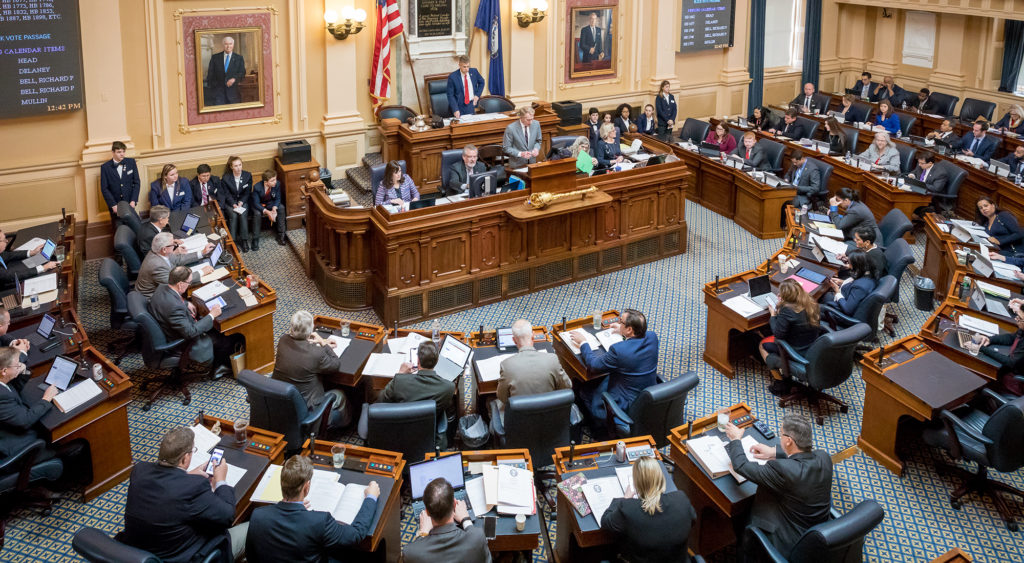One of the most important legislative packages to be considered during the Virginia General Assembly’s 47-day session this year arose from the Select Committee on School Safety. Speaker of the House Kirk Cox (R-Colonial Heights) commissioned the first select committee in 155 years following last February’s school shooting at Marjory Stoneman Douglas High School in Parkland, Florida.
Primed to increase security in schools across the Commonwealth and protect students, teachers, and staff from harm during emergencies, the statehouse passed a myriad of legislation that created a multi-year blueprint for improving school safety.
After the authorization of the 24-point priority recommendation plan to increase security in schools, Speaker Cox, who serves as chairman of the select committee, said during an address to the House Education Committee in January that the work done by the select committee was “groundbreaking.”
Some of the bills that were passed to enhance protections in Virginia schools are:
H.B. 1733, patroned by House Majority Leader Todd Gilbert (R-Shenandoah), would require a school division to enter into a memorandum of understanding with a local law enforcement agency that sets forth the powers and duties of school resource officers (SROs).
H.B. 1725, sponsored by Delegate Barry Knight (R-Chesapeake), dictates that each school board must cooperate with local building officials and a local fire marshal to develop a procurement plan to ensure that all security enhancements to public school buildings are in compliance with the Uniform Statewide Building Code and Statewide Fire Prevention Code.
H.B. 1729, introduced by House Education Committee Chairman Steven Landes (R-Augusta), would require school counselors across the state to spend at least 80 percent of their time counseling students.
H.B. 1732, sponsored by Delegate Israel O’Quinn (R-Bristol), would set forth annual safety training in public elementary and secondary schools. Principals would be required to develop and deliver – to each student and employee – training on safety procedures in the event of an emergency situation on school property.
H.B. 1738, introduced by Majority Whip Nick Rush (R-Floyd), would require a licensed architect or professional engineer to approve all plans and specifications for new or remodeled public school building construction. Moreover, the designee must be trained and experienced in crime prevention through environmental design.
H.B. 1734, introduced by Delegate and Vice-Chairman of the Select Committee on School Safety Danny Marshall (R-Danville), would require the Virginia Center for School and Campus Safety to develop a case management tool for use by public elementary and secondary school threat assessment teams, and require such threat assessment teams to use such tool to collect and report to the Center quantitative data on its activities.
H.B. 1737, sponsored by Delegate Thomas Wright (R-Cumberland), would require school boards to include the chief law enforcement officer, the fire chief, the chief of the emergency medical services agency, and the emergency management official of the locality, or their designees, in the development and review of school crisis, emergency management, and medical emergency response plans.
The final budget agreement, H.B. 1700, which was patroned by House Appropriations Chairman Chris Jones (R-Suffolk), provides approximately $12 million to fund school safety initiatives, including additional money for SROs, infrastructure improvements, and technology upgrades.
Governor Ralph Northam (D) will now be charged with signing the provisions into law, starting the mission to upgrade security and promote a better sense of safety in schools throughout the Commonwealth.
Pieces of legislation that will not make it to the governor’s desk are:
H.B. 1735, patroned by Delegate Roxann Robinson (R-Chesterfield), would direct the Student Behavioral Health Commission to study student behavioral health matters and establish a suicide and violence prevention tip line, similar to SafeUT. The Commission would analyze current school counselor-to-student ratios and whether the realignment of counseling responsibilities would improve student services.
Furthermore, additional de-escalation and alternative disciplinary policies when interacting with students suffering from mental health challenges may be implemented, with teacher training requirements on student mental health, such as mental health first aid. The bill passed the House, but was defeated in conference.
H.B. 1615, also introduced by Delegate Landes, would change the date of June primary elections from the second Tuesday of the month to the third Tuesday so schools will not be in session. The bill passed the House, but was defeated in the Senate.

